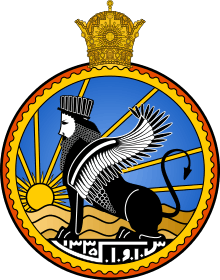Hassan Alavikia
Hassan Alavikia (Persian: حسن علویکیا, [hæsæn ælævikiːɒː]; 1 December 1910 – 20 April 2013) was a prominent general and businessman in the Pahlavi pre-revolutionary government of Iran. Along with Teymur Bakhtiar and Hassan Pakravan, he was a co-founder of the SAVAK.[1][2]
Hassan Alavikia | |
|---|---|
 | |
| Born | 1 December 1910 |
| Died | 20 April 2013 (aged 102) La Jolla, California, U.S. |
| Alma mater | University of Tehran Harvard University Harvard Law School |
| Occupation | Intelligence officer, businessman |
| Spouse(s) | Jila Pourrastegar (1956–2013, his death) |
| Children | 3 |
| Military career | |
| Allegiance | Iran |
| Service/ | Imperial Iranian Army SAVAK |
| Years of service | 1932–1967 |
| Rank | Lieutenant General |
Early life
Hassan Alavikia was born on 1 December 1910 in Hamedan, Iran, the son of Abu Torab Alavikia, a wealthy land owner. He completed his primary and secondary education at the Lycée St. Louis in Isfahan and Tehran. In 1932, he entered Tehran Military Academy, from which he graduated as a lieutenant in 1934. He continued his academic education at the University of Tehran and Harvard, graduating with degrees in judicial law and philosophy. He spoke fluent Persian, French, English, and German.
Political life
He served in the Iranian Army as Deputy Director of the Intelligence Department of the Army (1949–1951). In 1956, he left the Second Division, and became the first Deputy Director of the SAVAK (1956–1962) with General Teymur Bakhtiar as its first Director.[2][3][4][5][6][7]
In 1962, he was appointed as head of the European Operations Division of the SAVAK (1962-1967) by the Shah,[8][9] which at the time was headquartered in Cologne, Germany. He retired from the military in 1967,[10][11] and continued his professional career with the establishment of several successful businesses in the both the agricultural and real estate industry.
Later years
In January 1979, he and his wife left Iran to visit their daughters in Paris, France where they were studying; however, due to the turmoil and start of the Islamic revolution, they were unable to return to Iran. He spent the remainder of his life in exile in Paris, France, Gstaad, Switzerland, and Del Mar, California, where his three daughters and their families resided.[4]
Family
On 6 December 1956, General Alavikia married Jila Pourrastegar, the daughter of Hossein Pourrastegar, a well-known Colonel in the Persian Cossack Brigade under Reza Shah Pahlavi.
Death
He died on 20 April 2013 in La Jolla, California, surrounded by his wife, three children, and five grandchildren.
References
- Nima, Ramy (1983). The Wrath of Allah: Islamic Revolution and Reaction in Iran. Pluto Press. p. 36. ISBN 0861047338.
- Milani, Abbas (2008). Eminent Persians: The Men and Women Who Made Modern Iran, 1941-1979. Syracuse University Press. ISBN 0815609078.
- Ladjevardi, Habib (1988). Reference Guide to the Iranian Oral History Collection. Harvard University, Center for Middle Eastern Studies, Iranian Oral History Project. ISBN 0932885047.
- Ladjevardi, Habib. "Hassan Alavi-Kia. Interview recorded by Habib Ladjevardi, 1 March 1983, Paris, France. Iranian Oral History Collection, Harvard University.", Harvard University, Paris, France, 1 March 1983.
- Milani, Abbas (2011). The Shah. Macmillan. p. 122. ISBN 0230115624.
- Afkhami, Gholam Reza (2008). The Life and Times of the Shah. University of California Press. pp. 381–382. ISBN 0520942167.
- Blake, Kristen (2009). The U.S.-Soviet Confrontation in Iran, 1945–1962: A Case in the Annals of the Cold War. University Press of America. p. 107. ISBN 0761844953.
- Ghanei Fard, Erfan. "داستان ساواک و 'ژنرال' حسن علوی کیا", BBC, London, 8 May 2013. Retrieved on 20 May 2013.
- E'temad, Akbar (May 1983). "Alavi-Kiya, General Hasan". Foundation for Iranian Studies. Retrieved 5 June 2013.
- Ghanei Fard, Erfan. "ناگفته هايي از ساواك", Kurd Tabnak, Washington D.C., 28 April 2013. Retrieved on 20 May 2013.
- "Reading the Shah, and Ayatollahs in Tehran and What the U.S. Should Learn from the History". Omid Memarian. 24 January 2011. Retrieved 3 June 2013.
